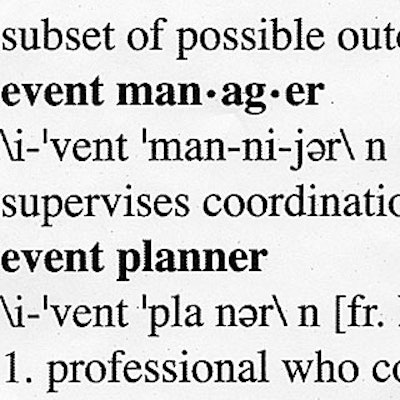Look through the business cards of people who plan events for a living, and you’re likely to find a lot of different titles. Some of them use different verbiage, but at least seem related: “Director, special events marketing.” “Conference and travel manager.” “Assistant director, corporate travel and meeting planning.”
But some people whose primary responsibility is organizing events and meetings have titles with neither of those words: A “director of the department of protocol” at a financial institution, for example, plans meetings, and some magazines list a “special projects director” who plans their parties.
All of that probably doesn’t really bother anyone. But labels can cause confusion. For example: What, exactly, is the difference between an “event planner,” an “event producer,” and an “event marketer”? The simple answer is that it depends who you ask. Looking at how people distinguish between those words can show how they make subtle distinctions between people’s skills and job responsibilities, and how they view the practice of putting on an event. (The distinctions also matter if you consider that developing industry-standard definitions is part of a profession’s maturation process.)
“An event planner in my mind is someone who deals with a traditional party with catering, flowers, cocktails, hors d’oeuvres—not so much of a production with entertainment and sound,” says Tanya Greenblatt, a partner at Event Resources Inc. “An event planner doesn’t necessarily get involved in the technical.phpects. We consider ourselves event producers because we get involved in the audio, video, staging, and how it all comes together.”
By that definition—which many people use—planners are a subset of producers; all producers are planners, but not all planners have the technical skills and knowledge of a producer.
Still, in many situations, a planner might be the one in charge. “As event planners, we come up with the ideas and hire people to handle the production details,” says John Sadaka, director of event planning for global communications at Prudential Financial. “We do more on the creative side.”
Karen Dalzell of Dalzell Productions, who works on film industry events including the Tribeca Film Festival, has used the word “producer” to describe her role since she started working on events about 10 years ago after working in theater, even though it hasn’t always been clear to everyone. “I’m pretty sure the word ‘producer’ has confused a number of my clients,” she says.
"The word ‘planner,’ when I started, sounded more along the lines of consumer events—weddings, large parties,” Dalzell says. But after watching businesspeople who plan corporate events earn more respect in their organizations and celebrity wedding planners get reams of press coverage for their over-the-top creations, the labels don’t mean much to her. “That’s all kind of blurry now,” she says. “If you’re an event planner, trust me, you’re a producer.”
In addition to being blurry, those terms may not even make sense, according to Joe Jeff Goldblatt, professor and head of the School of Tourism and Hospitality Management at Temple University. “‘Producer’ comes from television and theater. It doesn’t come from business,” he says. “The term ‘planner’ is a misnomer. Very few people plan an event and pass it on to someone else to execute.”
Goldblatt prefers job titles developed in the 1970’s by the Alberta Tourism Education Council: an “event manager” is defined as someone who has the overall authority for an event and its budget, and an “event coordinator” handles the day-to-day logistics of executing the event.
But whether you’re a producer or a manager or a coordinator, if you work on corporate functions, there’s probably one label you don’t use: “party planner.” “It says small parties with balloons,” says Megan Reynolds, a producer—that’s what her card says—in the New York office of Los Angeles-based Extraordinary Events. “I think of bar mitzvahs.” Not that there’s anything wrong with that—but for people who work in the corporate world, Reynolds says, “It’s a passé term now.”
The buzz word of the moment is “experiential marketing,” and “event marketer” is the current label with cachet. “We no longer have ‘parties’—events are part of an overall marketing plan,” Reynolds says.
In the past few years, many larger event production companies have started calling themselves “event marketing” firms. These are usually national or international companies with 100 or more employees that may be part of even larger conglomerates that also own advertising and PR agencies. (Adding to the
confusion, some people use “event marketing” to refer to the act of promoting an event, not actually running it.)
But big firms don’t own the word “marketing.” Although Lisa Lori Communications has just six full-time employees, David Bowen, its managing director of lifestyle marketing, uses the term “event marketer” to describe himself. “Marketer equals strategic planner, and it means putting an event in the context of a larger goal,” he says. After working in event and PR firms and in-house at Hearst Magazines, he uses different labels for different projects. “It’s fluid—you have to tailor your pitch to the client,” he says. “A production-heavy event requires a producer,” while for a more straightforward cocktail party he might just pitch himself as a “planner.”
Still, “planner” passes the elevator test—it’s the easiest answer when someone asks, So what do you do? “I say I’m an event planner,” says Heather Yacouby, a special events coordinator at Memorial Sloan-Kettering Cancer Center, “because I think that’s what people can understand.”
—Chad Kaydo
Posted 03.30.05
This story originally appeared in the April/May 2005 issue of the BiZBash Event Style Reporter.
But some people whose primary responsibility is organizing events and meetings have titles with neither of those words: A “director of the department of protocol” at a financial institution, for example, plans meetings, and some magazines list a “special projects director” who plans their parties.
All of that probably doesn’t really bother anyone. But labels can cause confusion. For example: What, exactly, is the difference between an “event planner,” an “event producer,” and an “event marketer”? The simple answer is that it depends who you ask. Looking at how people distinguish between those words can show how they make subtle distinctions between people’s skills and job responsibilities, and how they view the practice of putting on an event. (The distinctions also matter if you consider that developing industry-standard definitions is part of a profession’s maturation process.)
“An event planner in my mind is someone who deals with a traditional party with catering, flowers, cocktails, hors d’oeuvres—not so much of a production with entertainment and sound,” says Tanya Greenblatt, a partner at Event Resources Inc. “An event planner doesn’t necessarily get involved in the technical.phpects. We consider ourselves event producers because we get involved in the audio, video, staging, and how it all comes together.”
By that definition—which many people use—planners are a subset of producers; all producers are planners, but not all planners have the technical skills and knowledge of a producer.
Still, in many situations, a planner might be the one in charge. “As event planners, we come up with the ideas and hire people to handle the production details,” says John Sadaka, director of event planning for global communications at Prudential Financial. “We do more on the creative side.”
Karen Dalzell of Dalzell Productions, who works on film industry events including the Tribeca Film Festival, has used the word “producer” to describe her role since she started working on events about 10 years ago after working in theater, even though it hasn’t always been clear to everyone. “I’m pretty sure the word ‘producer’ has confused a number of my clients,” she says.
"The word ‘planner,’ when I started, sounded more along the lines of consumer events—weddings, large parties,” Dalzell says. But after watching businesspeople who plan corporate events earn more respect in their organizations and celebrity wedding planners get reams of press coverage for their over-the-top creations, the labels don’t mean much to her. “That’s all kind of blurry now,” she says. “If you’re an event planner, trust me, you’re a producer.”
In addition to being blurry, those terms may not even make sense, according to Joe Jeff Goldblatt, professor and head of the School of Tourism and Hospitality Management at Temple University. “‘Producer’ comes from television and theater. It doesn’t come from business,” he says. “The term ‘planner’ is a misnomer. Very few people plan an event and pass it on to someone else to execute.”
Goldblatt prefers job titles developed in the 1970’s by the Alberta Tourism Education Council: an “event manager” is defined as someone who has the overall authority for an event and its budget, and an “event coordinator” handles the day-to-day logistics of executing the event.
But whether you’re a producer or a manager or a coordinator, if you work on corporate functions, there’s probably one label you don’t use: “party planner.” “It says small parties with balloons,” says Megan Reynolds, a producer—that’s what her card says—in the New York office of Los Angeles-based Extraordinary Events. “I think of bar mitzvahs.” Not that there’s anything wrong with that—but for people who work in the corporate world, Reynolds says, “It’s a passé term now.”
The buzz word of the moment is “experiential marketing,” and “event marketer” is the current label with cachet. “We no longer have ‘parties’—events are part of an overall marketing plan,” Reynolds says.
In the past few years, many larger event production companies have started calling themselves “event marketing” firms. These are usually national or international companies with 100 or more employees that may be part of even larger conglomerates that also own advertising and PR agencies. (Adding to the
confusion, some people use “event marketing” to refer to the act of promoting an event, not actually running it.)
But big firms don’t own the word “marketing.” Although Lisa Lori Communications has just six full-time employees, David Bowen, its managing director of lifestyle marketing, uses the term “event marketer” to describe himself. “Marketer equals strategic planner, and it means putting an event in the context of a larger goal,” he says. After working in event and PR firms and in-house at Hearst Magazines, he uses different labels for different projects. “It’s fluid—you have to tailor your pitch to the client,” he says. “A production-heavy event requires a producer,” while for a more straightforward cocktail party he might just pitch himself as a “planner.”
Still, “planner” passes the elevator test—it’s the easiest answer when someone asks, So what do you do? “I say I’m an event planner,” says Heather Yacouby, a special events coordinator at Memorial Sloan-Kettering Cancer Center, “because I think that’s what people can understand.”
—Chad Kaydo
Posted 03.30.05
This story originally appeared in the April/May 2005 issue of the BiZBash Event Style Reporter.




















